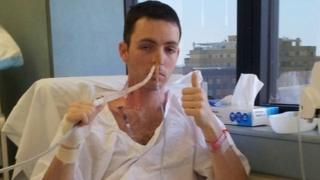Home » Australasia »
The family that changed Australia’s cannabis debate
Being a former police officer, Lou Haslam knew his family’s story about breaking Australian law to get medicinal cannabis for his son was powerful. It helped lead to a change in the law but, as Gary Nunn reports from Sydney, the family remains unhappy with the result.
Working undercover for the police drugs squad, Mr Haslam, now 66, arrested “a tonnage” of people for cannabis-related crimes in New South Wales (NSW) between 1972 and 2006.
“We were mainly after growers and suppliers,” he says.
Little did he know he’d later possess cannabis himself – and even purchase a farm to grow it. He began supplying cannabis to his own son, Dan Haslam, after he was diagnosed with bowel cancer in 2010.
‘You’d do anything’
The day of his son’s cancer diagnosis, Mr Haslam remembers feeling confusion, anger, fear then grief: “I just thought, this is a 20-year-old kid. What the bloody hell’s happening?”
Remembering how chemotherapy killed his son’s appetite takes Mr Haslam back to a dark time. “He was as sick as a dog,” he says. “For seven days afterwards, he couldn’t eat. He’d vomit. Ulcers filled his mouth. He lost so much weight and had no energy. Just as he’d feel better, it was time for his next round.”
Things got so bad that Dan would get anticipatory nausea – he’d vomit at the thought of chemotherapy. “Something had to give,” Mr Haslam says. “As a parent, you’d do anything – and I mean anything – to stop your kid suffering.”
A family friend who’d had colon cancer offered Dan cannabis to manage his nausea, pain and poor appetite. Dan, a “fitness freak”, declined. He feared his dad’s disapproval.
But Mr Haslam’s reaction shocked everyone. “I said, Christ almighty – go for it. Get some smoko. Anything to help my son.”
With ongoing use of the drug, sourced from the black market, Mr Haslam says his son’s ulcers disappeared, his appetite returned and his nausea depleted. “He’d tried every bloody pharmaceutical drug. They did nothing. This was really working.”
Dan went on to have “the best two years of his life”. With renewed energy, he travelled the world and married his university sweetheart, Alyce.
‘Bloody tough’ decision
Seeing its impact, the Haslams started hearing how medicinal cannabis helped others with chronic diseases, epilepsy and HIV. They decided to go public with their story to shift Australian lawmakers to legalise it for medicinal use.
“Up till that point, we’d never used the word ‘terminal’ – Dan hated it,” Mr Haslam says. “If our story was going to do any good, Dan had to not only accept his terminal diagnosis, but say that word. And I had to tell the world my son was about to die. It was bloody tough.”
The Haslams persuaded then NSW Premier Mike Baird to launch Australia’s first medicinal cannabis trial for terminally ill patients. At the time, Mr Baird wrote a piece for Sydney’s Daily Telegraph, headlined: “How a young man changed my mind on cannabis.”
Mr Baird tells the BBC: “The moment I met Dan I was convinced medical cannabis could make a difference. I could hear it in Dan’s voice; I could see it in his eyes.”
The family set up an online petition which amassed 320,000 signatures. They used those supporters to successfully lobby politicians. A picture of Dan sick on chemotherapy was circulated around Australia.
But as the campaign energy built, Dan’s began to wane. He died in 2015, aged 25.
On 24 February 2016, coinciding with the one-year anniversary of his death, medicinal cannabis was legalised by the Australian parliament. Some MPs called it “Dan’s Law”.
His parents had campaigned tirelessly in their first year without their son.
In an Australian first, Lou and Lucy Haslam purchased a farm earmarked to grow medicinal cannabis, which was opened by then Deputy Prime Minister Barnaby Joyce in Tamworth – Dan’s home town. It was called DanEden.
A new battle
But now, the Haslams are campaigning again.
They argue the number of Australian patients accessing medicinal cannabis is too low, and that the law isn’t working. They’ve reopened their petition using the hashtag #FixDansLaw.
The family says medicinal cannabis remains in regulatory limbo due to excessive regulation and bureaucracy, meaning some patients wait up to 19 months for a script. As of April 2019, there have been 5,200 medicinal cannabis approvals.
It must be accessed through a special scheme which, critics say, makes it onerous for doctors to prescribe. Australia has only 57 authorised prescribers of medicinal cannabis, according to the Therapeutic Goods Association (TGA), the national regulator.
Mrs Haslam adds: “Once approved, many patients realise they can’t afford it.” She says she knows of parents still breaking the law to get medicinal cannabis on the black market.
A TGA spokesperson tells the BBC that there’s “significant need” for larger medicinal cannabis research studies.
“There have only been a limited number of well-designed clinical studies on medicinal cannabis and so it is hard for some doctors to find quality evidence to support decisions to prescribe medicinal cannabis,” it says on its website. Such trials to check safety can last years, a UK committee recently heard.
The Australian Medical Association (AMA) acknowledges “the potential therapeutic uses” of cannabis. It says it supports the current regulator and the government’s desire to accelerate the process for patients to get the medication.
The Haslams fight on. Lou Haslam marvels at his wife Lucy, who founded a charity which campaigns for compassionate access to the medication.
“She works 14-hour days,” he says. “The death of a son changes you. She just won’t give up. Not now.”
Source: Read Full Article



